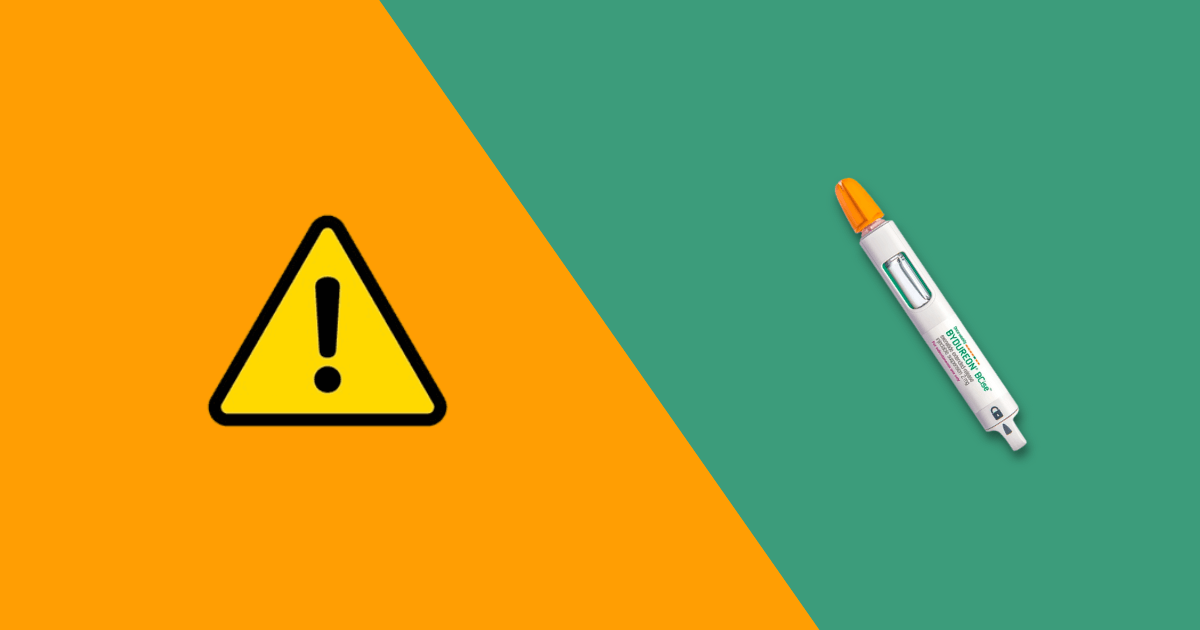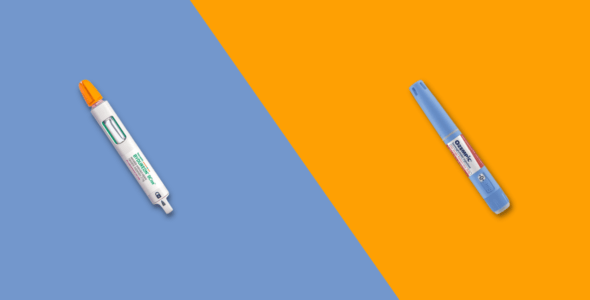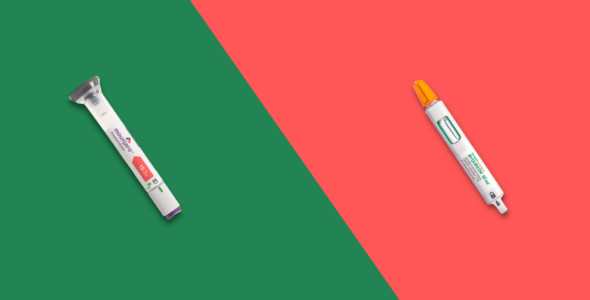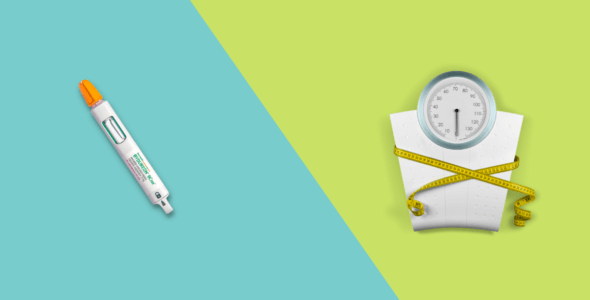Bydureon side effects and how to avoid them
Table of contents
Bydureon is an FDA-approved brand-name diabetes medication manufactured by AstraZeneca. It is classified as a glucagon-like peptide-1 agonist and is used to help control blood sugar levels in patients with type 2 diabetes. While Bydureon is generally well tolerated, there are some potential side effects that people should be aware of. The most common side effects of Bydureon include injection site reactions. Less common but more serious side effects can include thyroid tumors.
Learn more about the side effects of Bydureon and what you can do to avoid them.
What is Bydureon (exenatide)?
Bydureon is used to help control blood sugar levels in type 2 diabetes, a condition where the body is unable to produce enough insulin or does not respond to the insulin made as it normally would. This can lead to high blood sugar levels. Bydureon may be used alone or in combination with other medications, such as metformin or long-acting insulin. Bydureon may also be used for the treatment of Parkinson’s and also as a weight-loss therapy.
Exenatide, the active ingredient, is classed as an incretin mimetic and is used alongside diet and exercise in diabetes. Incretins such as glucagon-like-peptide-1 (GLP-1), improve insulin release that is dependent on blood glucose. Exenatide is a GLP-1 receptor agonist and has been shown in lab tests to attach to and stimulate the human GLP-1 receptor. This increases glucose-dependent insulin production from the pancreas as well as the release of insulin from pancreatic beta-cells. Exenatide also slows the time it takes for food to empty from the stomach. This combined action enables exenatide to help control blood glucose levels.
Bydureon BCise is not recommended to be used in people with type 1 diabetes.
What are the side effects of Bydureon Bcise?
The most common possible side effects of Bydureon include:
- Nausea, vomiting
- Gastrointestinal side effects – diarrhea, constipation, abdominal pain, and indigestion
- Headache
- Injection site reactions – with or without bumps (nodules)
- Skin abscess (a bump within or below the surface of your skin)
More serious side effects of Bydureon include:
- Unusual bleeding or bruising
- Severe nausea and vomiting
- Life-threatening allergic reactions – swelling in your neck or throat, difficulty breathing or swallowing
- Pain in your upper stomach spreading to your back, fever, increased heart rate, yellow color to eyes or skin
- Hypoglycemia (low blood sugar) – headache, dizziness, sweating, confusion or drowsiness, blurred vision, slurred speech, fast heartbeat, anxiety, and mood changes
- Painful, difficult, or low urination, swelling in your feet or ankles, tiredness or shortness of breath
If you experience any of these serious side effects, stop taking Bydureon and seek medical attention immediately. You are encouraged to report negative side effects of prescription drugs to the FDA. Visit www.fda.gov/medwatch, or call 1-800-FDA-1088.
Bydureon drug interactions
Bydureon can interact with other medications, including:
- Treatments for skin cancer
- Treatments for HIV/AIDS
- Diuretics, taken to treat high blood pressure
- Steroid treatment
- Treatment for hypertension
- Anti-coagulants – warfarin
- ACE (angiotensin-converting enzyme) inhibitors
- Sulfonylureas – glyburide, gliclazide, glipizide
- Antibiotics
Bydureon can interact with other medications. This can change how Bydureon and other medications work and can make side effects more likely. Tell your prescribing physician about all your drugs, including vitamins and dietary supplements.
Bydureon warnings & precautions
You should not use Bydureon if you:
- Are allergic to the active ingredient exenatide
- Have had an allergic reaction to any of the other ingredients in Bydureon
- Have a personal or family history of thyroid cancer
- Or your family members have ever had medullary thyroid carcinoma (MTC)
- Have an endocrine system condition called Multiple Endocrine Neoplasia syndrome type 2 (MEN 2)
- Have a history of low platelets (thrombocytopenia) while using exenatide
- Are younger than 18 years of age
Talk to your doctor before using Bydureon if you:
- Are taking any of the medications that could interact with Bydureon
- Have kidney disease, have had a kidney transplant, or any other kidney problems
- Have slowed emptying of your stomach (gastroparesis)
- Have pancreatitis
- Have gall stones
- Are pregnant or are planning to become pregnant
- Are breastfeeding or are planning to breastfeed
You should always check with your doctor or pharmacist before taking any medication, including Bydureon, to make sure it is safe for you.
Bydureon dosage
Bydureon is available as an exenatide extended-release injectable suspension in the following forms:
- 2 mg of exenatide in single-dose vials
- Single-dose pens auto-injector containing 2 mg of exenatide
Bydureon BCise is given as an injection under your skin (subcutaneous) in the stomach, thighs, or upper arm area, usually once every 7 days. Bydureon can be used with or without food and given at any time of the day. If you forget to take Bydureon, take it as soon as you remember, but skip the missed dose if your next dose is due within 3 days. Do not double up your doses.
Low blood sugar can make you hungry, dizzy, or shaky. To treat hypoglycemia, eat or drink candy, raisins, or non-diet soda. Your healthcare provider may prescribe glucagon tablets or injections in case of severe hypoglycemia. Refrigerate Bydureon and use until the expiration date. Do not freeze Bydureon. Bydureon may also be stored at room temperature for up to 4 weeks.
You are advised to read the medication guide provided with this medicine for the drug information and patient information, and always speak with your healthcare provider for medical advice about any changes to your dose so they can monitor and evaluate your condition.
How long can you stay on Bydureon?
Bydureon is used once every 7 days. After 10 weeks of once-weekly continued use, Bydureon will maintain a consistent level of medicine in your body.
What are the dangers of taking Bydureon?
Bydureon may cause serious side effects such as thyroid tumors. Speak to your doctor if you get any swelling in your neck, have problems swallowing, or have shortness of breath.
Does Bydureon cause lumps in your throat?
Bydureon may cause symptoms of a thyroid tumor. Symptoms may include a lump in your neck, difficulty swallowing, trouble breathing, and changes to your voice. Speak to your doctor for medical advice if you experience these side effects.
Does Bydureon cause weight gain?
No. Bydureon may cause you to have a decrease in your appetite, causing you to potentially lose weight.
Does Bydureon cause hair loss?
Hair loss is a side effect of using Bydureon. This is most common in females over the age of 60 who have been taking Bydureon for 1 – 6 months.
What happens when you stop taking Bydureon?
Bydureon does not cause withdrawal reactions when you stop treatment. However, blood sugar levels may rise over time once you stop using it.
Does Bydureon cause tingling or numbness?
Bydureon may cause tingling and numbness in your lips if you become hypoglycemic (low blood sugar levels). Other symptoms of hypoglycemia will include hunger, confusion, and feeling weak and shaky. Contact your doctor if you experience these symptoms, as you may need to have your dose of Bydureon adjusted.
Is Bydureon a blood thinner?
Bydureon is not a blood thinner; it is classed as a glucagon-like peptide-1 (GLP-1) agonist. Bydureon increases how much insulin your pancreas produces in your body, causing blood sugar levels to fall.
What is the difference between Bydureon and Byetta?
Bydureon and Byetta both contain exenatide. Byetta is a short-acting version of exenatide, and Bydureon is the extended-release form. Byetta is used to treat adults only with Type 2 diabetes, while Bydureon is used in adults and children 10 years of age and older.
Is it safe to take Bydureon if you have diabetes?
Bydureon is used in combination with changes to diet and exercise to help manage blood sugar levels in Type 2 diabetes in adults and children 10 years of age and older.
How to avoid Bydureon side effects
The best way to avoid side effects is to take Bydureon as directed by your doctor. Follow your doctor’s instructions carefully and do not take more or less than prescribed.
If you experience any side effects, talk to your doctor or pharmacist. They may be able to recommend ways to help reduce or prevent some of the side effects.
1. Stick to the recommended dosage
Take your prescribed dose of Bydureon that has been recommended by your healthcare professional. Do not take more or less than prescribed.
2. Monitor your blood sugar levels
If you have diabetes, it is important to monitor your blood sugar levels closely while taking Bydureon. Check your blood sugar levels as directed by your doctor and report any changes to your doctor immediately.
3. Drink plenty of fluids
Drink eight to 10 glasses of water or fluids every day to help prevent dehydration, which can make side effects worse.
4. Avoid alcohol
Avoid excessive alcohol consumption while taking Bydureon. Alcohol can increase your chances of developing low blood sugar, and excessive alcohol consumption could increase the risk of side effects from using Bydureon. Speak to your healthcare provider for further guidance on alcohol consumption when using Bydureon.
5. Don’t skip meals
Eating regular meals and snacks will help to prevent low blood sugar levels (hypoglycemia).
6. Check your feet
If you have diabetes, check your feet for any cuts, sores, or redness regularly. Tell your doctor if you experience any problems with your feet while taking Bydureon.
7. Know the signs and symptoms of Bydureon side effects
Signs and symptoms of side effects include nausea and vomiting. If you experience any of these symptoms speak to your doctor for medical advice.
8. Monitor your weight
Bydureon may cause weight loss due to a loss of appetite. If you experience this side effect while taking Bydureon, get medical advice from your doctor.
9. Tell your doctor about all medications you’re taking
Be sure to tell your doctor about all other medications you’re taking, including over-the-counter drugs, vitamins, and herbal supplements, as they can interact with Bydureon.
10. Get regular medical check ups
It is important to get regular medical check ups and monitor your medical conditions. Your doctor will monitor your side effects and may adjust your dose of Bydureon as needed.
Medically reviewed
A medical professional has reviewed this article.


Jamie Winn, PharmD
Jamie Winn, PharmD
Dr. Jamie Winn received his Doctor of Pharmacy in 2002 from the University of South Carolina College of Pharmacy, Columbia, SC. Jamie is a medical reviewer for NiceRx.




